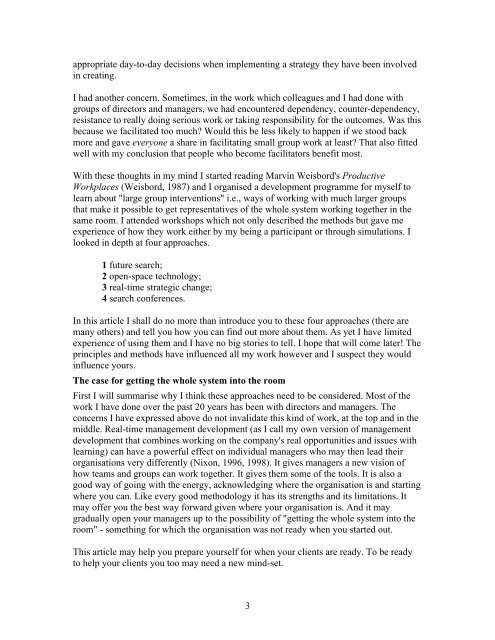Creating the futures we desire - getting the whole ... - Bruce Nixon
Creating the futures we desire - getting the whole ... - Bruce Nixon
Creating the futures we desire - getting the whole ... - Bruce Nixon
You also want an ePaper? Increase the reach of your titles
YUMPU automatically turns print PDFs into web optimized ePapers that Google loves.
appropriate day-to-day decisions when implementing a strategy <strong>the</strong>y have been involved<br />
in creating.<br />
I had ano<strong>the</strong>r concern. Sometimes, in <strong>the</strong> work which colleagues and I had done with<br />
groups of directors and managers, <strong>we</strong> had encountered dependency, counter-dependency,<br />
resistance to really doing serious work or taking responsibility for <strong>the</strong> outcomes. Was this<br />
because <strong>we</strong> facilitated too much Would this be less likely to happen if <strong>we</strong> stood back<br />
more and gave everyone a share in facilitating small group work at least That also fitted<br />
<strong>we</strong>ll with my conclusion that people who become facilitators benefit most.<br />
With <strong>the</strong>se thoughts in my mind I started reading Marvin Weisbord's Productive<br />
Workplaces (Weisbord, 1987) and I organised a development programme for myself to<br />
learn about "large group interventions" i.e., ways of working with much larger groups<br />
that make it possible to get representatives of <strong>the</strong> <strong>whole</strong> system working toge<strong>the</strong>r in <strong>the</strong><br />
same room. I attended workshops which not only described <strong>the</strong> methods but gave me<br />
experience of how <strong>the</strong>y work ei<strong>the</strong>r by my being a participant or through simulations. I<br />
looked in depth at four approaches.<br />
1 future search;<br />
2 open-space technology;<br />
3 real-time strategic change;<br />
4 search conferences.<br />
In this article I shall do no more than introduce you to <strong>the</strong>se four approaches (<strong>the</strong>re are<br />
many o<strong>the</strong>rs) and tell you how you can find out more about <strong>the</strong>m. As yet I have limited<br />
experience of using <strong>the</strong>m and I have no big stories to tell. I hope that will come later! The<br />
principles and methods have influenced all my work ho<strong>we</strong>ver and I suspect <strong>the</strong>y would<br />
influence yours.<br />
The case for <strong>getting</strong> <strong>the</strong> <strong>whole</strong> system into <strong>the</strong> room<br />
First I will summarise why I think <strong>the</strong>se approaches need to be considered. Most of <strong>the</strong><br />
work I have done over <strong>the</strong> past 20 years has been with directors and managers. The<br />
concerns I have expressed above do not invalidate this kind of work, at <strong>the</strong> top and in <strong>the</strong><br />
middle. Real-time management development (as I call my own version of management<br />
development that combines working on <strong>the</strong> company's real opportunities and issues with<br />
learning) can have a po<strong>we</strong>rful effect on individual managers who may <strong>the</strong>n lead <strong>the</strong>ir<br />
organisations very differently (<strong>Nixon</strong>, 1996, 1998). It gives managers a new vision of<br />
how teams and groups can work toge<strong>the</strong>r. It gives <strong>the</strong>m some of <strong>the</strong> tools. It is also a<br />
good way of going with <strong>the</strong> energy, acknowledging where <strong>the</strong> organisation is and starting<br />
where you can. Like every good methodology it has its strengths and its limitations. It<br />
may offer you <strong>the</strong> best way forward given where your organisation is. And it may<br />
gradually open your managers up to <strong>the</strong> possibility of "<strong>getting</strong> <strong>the</strong> <strong>whole</strong> system into <strong>the</strong><br />
room" - something for which <strong>the</strong> organisation was not ready when you started out.<br />
This article may help you prepare yourself for when your clients are ready. To be ready<br />
to help your clients you too may need a new mind-set.<br />
3



